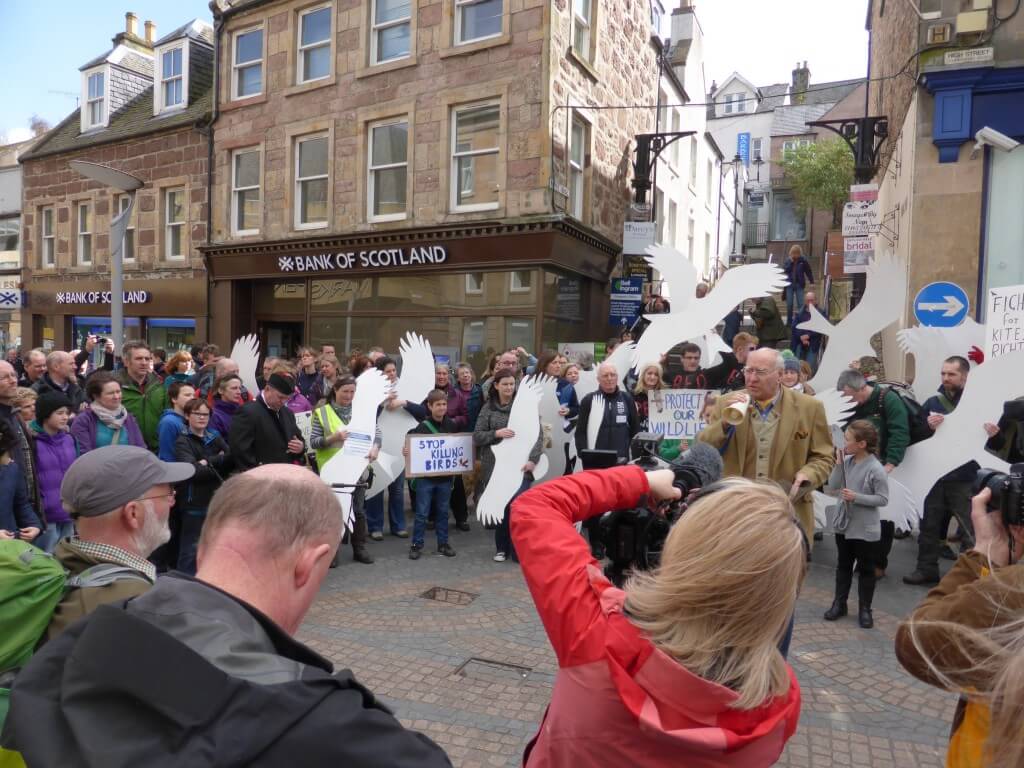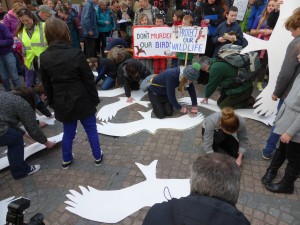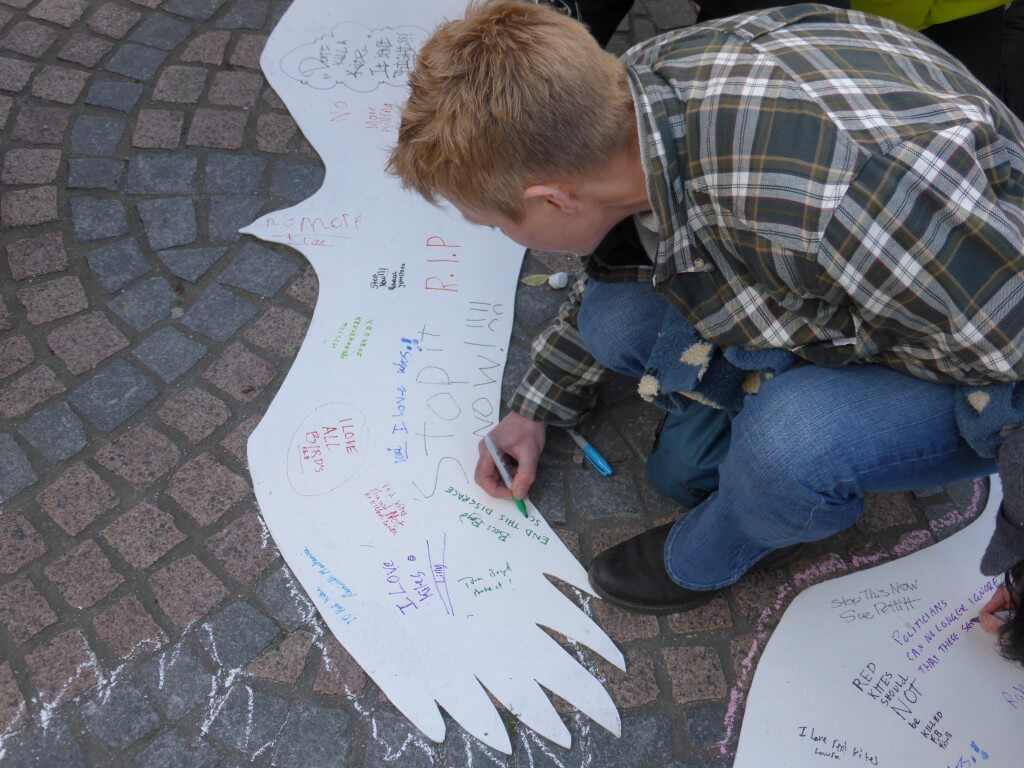
Danny Heptinstall is a 24 year old birder, naturalist and aspiring conservationist currently researching Red Kites at the University of Aberdeen (and recent Guest Blogger here). He attended the public protest in Inverness on Saturday afternoon about the recent poisoning incident in Ross-shire.
You will already have read here (and here and here) about the appalling poisoning of 14 Red Kites and 5 Buzzards near Inverness.
Unsurprisingly there’s been a lot of public anger about the incident, both in the Highlands and in the rest of the UK. Surprisingly though, on Saturday, the RSPB took to the streets to vent its anger and let others do the same.
I say surprisingly, as I don’t really consider the RSPB as a street protest kind of organisation. It does well at signing petitions, lobbying policymakers and organising photo-shoots. But when it comes to gathering the masses on the street, I’m not sure that’s usually the RSPB’s style (please let me know if I’m wrong!). Which I guess shows just how outraged the RSPB are that poisoning continues up and down the country.

The words protest or demonstration can sometimes be controversial, but this wasn’t the sort of protest with offensive chanting, crude placards and a general “angry mobbish” feel to it. It was very much what you might expect an RSPB protest to be – dignified, calm and very hard-hitting.
Before the protest began, 19 life-sized wooden cut-outs of red kites and buzzards were paraded around the streets of Inverness before converging on the site of the protest. These were painted white, to represent the ghosts of the dead birds, and were used to encourage the public to attend the protest. The protest itself was short, beginning with a piper’s lament followed by three short speeches and ending with the marking of 19 chalk raptor outlines.
Despite conservation being a movement (i.e. a group of people working together to advance their shared political, social or artistic ideas) it’s very rare for conservation supporters to come together as a group and make their voice publicly known. Consequently this was my first time attending a conservation protest.
And I found the event incredibly empowering, as it is not every day you feel like you are actively making a difference on an issue, especially when compared to the somewhat passive nature of writing to a politician or signing a petition. Given the number of home-made placards people brought along, I have a feeling I wasn’t the only one to feel this way!
I was also proud to be able to meet with a group of like-minded people and together share our thoughts with the public. It was fantastic to feel part of a conservation community, and seeing so many different people share my views was not only reassuring but also incredibly motivating; it felt like we could bring about change. It was also great to be able to chat to the public about a conservation issue.
So did the protest have an impact? Well politicians now know many people are so disgusted by illegal poisoning their prepared to march on the streets, the media were in attendance so the protest made the TV, web and print news. Also several hundred shoppers on the Inverness high street will certainly have had their interest raised! So yes I think it sent a clear message that the local community will not tolerate any more poisoning. I would also say bringing together so many like-minded people in one place can only strengthen the resolve of those involved in the cause.
That said, I think more could have been done to communicate to the passing public what was happening, why poisoning must be stopped and what they can do to help. It would also have been good to have one slightly more rousing speaker or MC. But with such little time to prepare, and this being RSPB North Scotland’s first protest, I think these can be forgiven!
I don’t think coming out on the streets is the sole answer to anything and, as a political tactic, I’m not sure public protest is necessary for every conservation campaign. But I feel allowing those conservationists who care about a particular issue to come together and let the public know their views is a very positive act that I’d like to be a part of again.
I think public protest can have real value in highlighting an issue to the public, showing our strength to politicians, and bringing people together. And I for one hope UK conservation will turn to it more frequently.
I’d be interested to know, if you think the same?
And Mark writes: come back at 6pm for news of another planned public protest.

[registration_form]
Danny – many thanks for this. I have been on quite a few protests with the RSPB over the years. They have included subjects such as climate change and building airports on wildlife sites. Fun aren’t they?! thanks for your blog.
This sounds great and I totally agree that these events are motivating and empowering, I’d like to see more of them including festivals. I think that picking your protests and subjects is important as well as working with other NGOs like the stop climate chaos coalition. How about writing to Mike Clarke?
Amanda – welcome and thank you.
It was good to see a reasonable turn out, and those who spoke gave what I thought were short and punchy speeches, though decent amplification would have meant people at the back could have actually heard what was being said.
Donald – welcome and thank you.
One dislike? How can anyone dislike this? What is there to dislike?
Stewart – welcome! Good question!
This year marks 25 years since the killing of the Hen Harriers at RSPB Geltsdale. Out of the 2 pairs one male was killed on the reserve and a female just off the reserve with this pair having terriers put into the nest to kill the young. One young bird was left to be fed by the remaining female on the reserve. The media had a field day making news around the world and the outcome was I was asked to leave my job as warden [the end of this sentence and all of the next have been omitted here – because I am not sure of the facts of what has been said nor of the wisdom of saying it from a legal point of view – Mark Avery]. 25 years later and the killing still goes on!
“Dignified and calm”..Im sure..hard hitting?..I doubt it. That approach has made damn all difference over recent decades. You need to show real anger and actually target those who are responsible – demonstrate outside police HQ in Inverness, find the offices of the landowners and their representatives and challenge them…put a banner up on Kessock Bridge…but waving placards at shoppers wont do it…oh and start a campaign to Ban Driven Grouse Shooting [yes, I know this was a low ground poisoning but its all the same issue of lawlessness] and actually start to rock their rotten boat.
Agreed. At a recent RSPB training event I suggested that people should be prepared to show a bit more anger or emotion, rather than appearing so calm or placid (better words can probably be used here), when campaigning against such outrages. Other people taking part in the discussion didn’t like the idea of being considered “aggressive”.
One other thing. Danny mentions use of petitions as one of the campaigning methods that the RSPB uses. Really? The RSPB positively avoids promoting or being involved in any way with e-petitions. Their justification is that if they support every petition there is a loss of validity, and I agree they have a point there. But surely a carefully worded petition on a special issue such as this, backed with encouragement to their membership to sign, would be a useful campaigning tool to demonstrate how strong public feeling is.
I am concerned that protests and petitions get ignored so much of the time – It needs real numbers to speak out to make a difference.
Don’t get me wrong, protest and sign, but who listens? How do you make an ignorant load of toff politicians hear our voice – I despair!
We have a holiday booked near Inverness, & will go and enjoy what the Highlands has to offer. This year we will make a point of not visiting the Black Isle – no one will notice as we are a drop in the ocean – we can but try!
Write to the Cahirman and Chief Exec of VisitScotland, and the Environment Minister Paul Wheelhouse and possibly more importantly Fergus Ewing the Tourism Minister and tell them what you are doing and why…please.
I can do that – thanks!
Giving the ordinary conservationist in the street a chance to actively show their objection to something is very worthwhile. We can’t just leave it up to online petitions and NGOs to lobby behind the scenes. Many members of these groups want to play an active role – something we found out in Derby recently when we took to demonstrate outside a council house where key decisions were being made. We all felt better for actually being able able to do something obvious and vocal. And it did no end of good for the groups themselves that were seen to be taking action, not just standing idly by. Protest action could maybe have been more effective. But its so much better than no protects. We made mistakes ourselves – with hindsight we could have done so much more. But we did win in the end, and if that comes out of the Inverness protest, too, then every single person present will know they did their bit. We need to encourage more of this action – and perhaps offer help and guidance to make each and every locally-organised protest more effective in future. Well done to the RSPB for encouraging local group member to go out and take a stand for conservation.
Nick – well said.
Every effort that is made to draw attention to the problem of persecution of birds of prey in Scotland is never wasted no matter how little – here’s hoping the hundreds that were in Inverness on Saturday all continue to keep the subject in peoples minds. This drew attention to the 19 birds – red kites and buzzards that were recently poisoned on the Black Isle – but these were just the tip of a very dirty iceberg – literally THOUSANDS of others – eagles, peregrines, buzzards, red kites and hen harriers have been persecuted – poisoned, shot and trapped – mainly on sporting estates over the last 25 years. (and I know for a fact that there have been thousands killed) I drive 100-200 miles a day mainly over moorland in north Perthshire and Speyside as well as the West Coast and it saddens me that on a good day I might see some buzzards or the occasional kestrel but it is a long time since I saw a hen harrier. I see more eagles than hen harriers. I am one of the lucky ones – I wonder how many people who attended the protect in Inverness have actually seen a hen harrer? How are people going to explain to their children and grandchildren why these birds are rarely seen if at all? In my view this is no different to the slaughter of elephants and rhino in Africa – and this is happening on our doorstep. Those enforcing the law are simply not handing out realistic deterrents – a £200 or even a £2,000 fine is peanuts if the landowner is a multi-millionnaire – and that is if anyone is taken to court in the first place. 99% of the time the culprits are not caught or taken to court and the rare ones that are just get a slap on the wrist. What is the point of now having a law of Vicarious Liability if no one actually has the guts to enforce it? Meanwhile I do hope the deaths of these recent birds highlight the bigger issues.
Caroline – thank you for your comment.
I do feel that given the grave threats various bird species are facing in the U.K, it really has gone beyond the point where the RSPB and the Wildlife Trusts, both organisations with enormous memberships, should think about mobilizing their supporters to save our wildlife before it is too late.